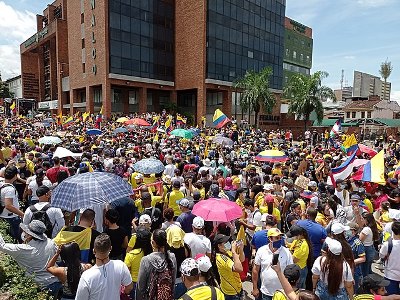
After a month of mass mobilizations, protestors and strikers in Colombia continue to struggle against the murderous capitalist government of President Iván Duque Márquez.
Widespread protests and strikes began in opposition to a now-withdrawn tax reform law but have since expanded to call for a basic income, opportunities for young and indigenous people, and to end police brutality.
This revolutionary struggle, led by trade unionists, youth, indigenous people, and peasants has sparked solidarity protests internationally. In London, New York, Miami, and many other cities, workers, and youth held solidarity protests, condemning the Duque regime and the violent police response to protests and strikes.
It has been reported that over 40 protestors have been murdered by the police, though the count is probably higher than that. Over 2,000 have been injured and over 100 are missing. The National Police of Colombia has responded to the protests by firing live bullets into crowds of peaceful protestors, sparking outrage and indignation.
Human rights organizations have condemned the Colombian police for these human rights abuses. On Friday, Duque announced that the Colombian Military will be deployed in the western province of Valle de Cauca after four protestors were killed.
The tax reform law was just the spark that moved millions into struggle. Anger had been brewing already over poverty and unemployment, the government’s botched covid response, and police brutality.
Colombia has the highest poverty rate in Latin America (estimated between 37-47% of the population). The COVID-19 pandemic pushed another 3.6 million Colombians into poverty. Since the start of the pandemic, food and fuel prices have increased dramatically, and local states have been involved in COVID-19 relief-related corruption.
Indigenous rights activists continue to be persecuted by the Colombian government and police, with increasing military presence in indigenous areas. The 2016 deal between the Colombian government under then-president Juan Manuel Santos and groups like the Revolutionary Armed Forces of Colombia (FARC), which promised some minor social support for indigenous peoples, has been dismantled under the Duque regime.
The tax reform aimed to cut the government “deficit” by increasing taxes on working and poor people. Like the rise in metro prices that sparked the movement in Chile, this was the straw that broke the camel’s back in Colombia. The movement has been victorious in winning some demands. For example, Duque has told congress not to pass the tax reform law, and its author, Alberto Carrasquillo, has stepped down.
Since then, negotiations between strikers and protestors and the government have stalled. The government wants the protestors to agree to end the roadblocks, arguing that they are crippling the economy of cities. The economy of these cities doesn’t serve working people – they serve to dish up profits to the Colombian and international capitalists. Stopping their profits is the point! The movement should continue to use militant tactics like roadblocks and general strikes and not back down. These militant tactics are what will win the movement’s demands! The government has not signed the deal, saying that ending the roadblocks is non-negotiable. They are refusing to condemn the violence committed by police against peaceful protestors, instead of blaming the FARC for fomenting violence.
Protests and strikes must continue, using militant, fighting tactics, to fight for a socialist solution that would ensure economic security, self-determination of indigenous peoples, and social equality. The military and police response to the strikes and protests shows that the Colombian government is afraid of the united working class! Police brutality must be stopped by the mass movement.
We call for:
- Organized committees of trade unions and community groups to democratically decide the way forward for the movement
- The movement must convene a national assembly to plan the struggle to defeat the government. It is also necessary to create self-defense committees.
- Building a mass working-class party that can continue to fight for socialist economic and social policies
- For a government of workers, peasants, and indigenous people, that can take big businesses and large landowners under the democratic control of the workers to build a socialist plan and break with capitalism.
Special financial appeal to all readers of socialistworld.net |
Support building alternative socialist media Socialistworld.net provides a unique analysis and perspective of world events. Socialistworld.net also plays a crucial role in building the struggle for socialism across all continents. Capitalism has failed! Assist us to build the fight-back and prepare for the stormy period of class struggles ahead. Please make a donation to help us reach more readers and to widen our socialist campaigning work across the world. |
Donate via Paypal |
| M | T | W | T | F | S | S |
|---|---|---|---|---|---|---|
| 1 | 2 | 3 | 4 | 5 | 6 | |
| 7 | 8 | 9 | 10 | 11 | 12 | 13 |
| 14 | 15 | 16 | 17 | 18 | 19 | 20 |
| 21 | 22 | 23 | 24 | 25 | 26 | 27 |
| 28 | 29 | 30 | ||||

